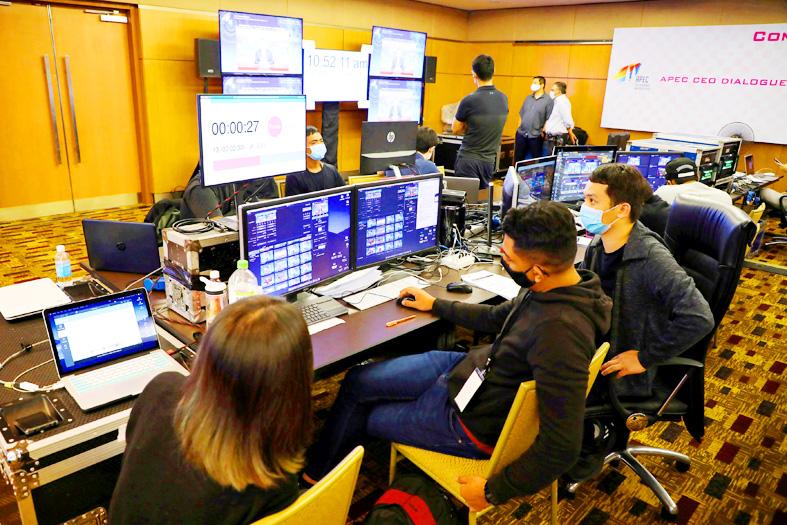Asia-Pacific leaders yesterday called for open and multilateral trade to support a global economy battered by the COVID-19 pandemic.
Chinese President Xi Jinping (習近平), among the leaders at a virtual meeting of the 21-member APEC forum, rejected protectionism and said that globalization was “irreversible.”
“We will not reverse course or run against historical trend by ‘decoupling’ or forming a small circle to keep others out,” Xi said at a forum ahead of the APEC leaders meeting to be held virtually in Kuala Lumpur today.

Photo: Reuters
“China will remain committed to openness and cooperation, and adhere to multilateralism and the principle of extensive consultation, joint contribution and shared benefits,” he said.
Xi said that “mounting unilateralism, protectionism and bullying, as well as backlash against economic globalization” had added to risks and uncertainties in the world economy.
The APEC leaders’ meeting comes as economies are trying to recover from the impact of the pandemic.
US President Donald Trump was due to represent the US at the virtual summit today, a US official said.
It would be the first time he has joined an APEC summit since 2017, the only time he has participated.
Singaporean Prime Minister Lee Hsien Loong (李顯龍) told the APEC forum that he expected “more multilateralists” in the administration of US president-elect Joe Biden.
“I think that they will be more supportive of the WTO, and of APEC. I am not sure that they will be more keen on throwing the doors wide open, or joining the CPTPP, because that depends on domestic politics too,” he said, referring to the Comprehensive and Progressive Agreement for Trans-Pacific Partnership.
Lee also said that US trade policies under Trump had weighed on APEC’s progress in the past few years, which he termed “very slow.”
“Also, they have not been supportive of trade as a win-win proposition,” Lee said.
“The attitude of the Trump administration is that this is a win-lose proposition,” he said.
Trump withdrew the US from the Trans-Pacific Partnership in 2017, which has since changed its name to the CPTPP.
The US is also absent from the world’s largest free-trade bloc, the Regional Comprehensive Partnership Agreement (RCEP) — a 15-nation pact backed by China that was signed last week.
At the previous APEC meeting in 2018, the countries failed to agree on a joint communique, the first time in the bloc’s history, as the US and China stood at opposing ends of talks on trade and investments.
Malaysian Prime Minister Muhyidin Yassin said that APEC countries were working on a “post-2020” vision, and that free and multilateral trade was integral to economic recovery.
“This is essential for our businesses as market stability and predictability are the central pillars which ensure that trade and investment continue to flow, even during times of crisis,” Yassin said.

Semiconductor shares in China surged yesterday after Reuters reported the US had ordered chipmaking giant Taiwan Semiconductor Manufacturing Co (TSMC, 台積電) to halt shipments of advanced chips to Chinese customers, which investors believe could accelerate Beijing’s self-reliance efforts. TSMC yesterday started to suspend shipments of certain sophisticated chips to some Chinese clients after receiving a letter from the US Department of Commerce imposing export restrictions on those products, Reuters reported on Sunday, citing an unnamed source. The US imposed export restrictions on TSMC’s 7-nanometer or more advanced designs, Reuters reported. Investors figured that would encourage authorities to support China’s industry and bought shares

TECH WAR CONTINUES: The suspension of TSMC AI chips and GPUs would be a heavy blow to China’s chip designers and would affect its competitive edge Taiwan Semiconductor Manufacturing Co (TSMC, 台積電), the world’s biggest contract chipmaker, is reportedly to halt supply of artificial intelligence (AI) chips and graphics processing units (GPUs) made on 7-nanometer or more advanced process technologies from next week in order to comply with US Department of Commerce rules. TSMC has sent e-mails to its Chinese AI customers, informing them about the suspension starting on Monday, Chinese online news outlet Ijiwei.com (愛集微) reported yesterday. The US Department of Commerce has not formally unveiled further semiconductor measures against China yet. “TSMC does not comment on market rumors. TSMC is a law-abiding company and we are

FLEXIBLE: Taiwan can develop its own ground station equipment, and has highly competitive manufacturers and suppliers with diversified production, the MOEA said The Ministry of Economic Affairs (MOEA) yesterday disputed reports that suppliers to US-based Space Exploration Technologies Corp (SpaceX) had been asked to move production out of Taiwan. Reuters had reported on Tuesday last week that Elon Musk-owned SpaceX had asked their manufacturers to produce outside of Taiwan given geopolitical risks and that at least one Taiwanese supplier had been pushed to relocate production to Vietnam. SpaceX’s requests place a renewed focus on the contentious relationship Musk has had with Taiwan, especially after he said last year that Taiwan is an “integral part” of China, sparking sharp criticism from Taiwanese authorities. The ministry said

US President Joe Biden’s administration is racing to complete CHIPS and Science Act agreements with companies such as Intel Corp and Samsung Electronics Co, aiming to shore up one of its signature initiatives before US president-elect Donald Trump enters the White House. The US Department of Commerce has allocated more than 90 percent of the US$39 billion in grants under the act, a landmark law enacted in 2022 designed to rebuild the domestic chip industry. However, the agency has only announced one binding agreement so far. The next two months would prove critical for more than 20 companies still in the process